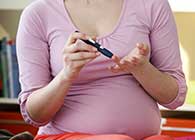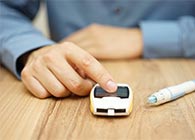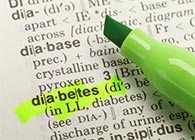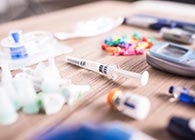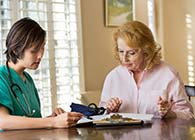Diagnosis
Child diagnosis
The role of parents and their involvement in day to day living with diabetes is very different according to the age of their child when diagnosed. If your child is diagnosed when young, then clearly, as a parent, you are taking full responsibility for your child’s diabetes everyday and for 24 hours a day. If your child is a teenager when diagnosed then very often the teenager takes immediate responsibility for injections, blood testing, diet etc and the parents role is one of watching over with less direct involvement. This may sound easier but in many ways it isn’t, especially if your teenager’s diabetes clinic has given you only minimal involvement in the diabetes educational programme.
However, whatever the age of your child when diabetes is diagnosed, it is a difficult, often traumatic time and most parents go through similar feelings. We care deeply for our children and it would not be natural if we did not go through a period of grief. These feelings are:
Shock – That this can happen to our child.
Denial – ‘This can’t be happening to my child’. ‘I’ll wake up in the morning and it will have been a bad dream.’
Anger – ‘Why my child?’ ‘Why not someone else’s child?’
Sadness and grief – A sense of loss for the healthy child you had and for the expectations you had for your once healthy child.
Guilt – ‘Is it something that I have done?’ ‘Could I have prevented it?’ Guilt is not a rational feeling because it is certainly not anyone’s fault when a child has diabetes. But Mums especially seem to feel guilt when their child is diagnosed and probably for a long time afterwards. But there is a very important message for ALL parents: Whatever you may feel or think and whatever the cause of diabetes, it is NEVER YOUR fault that your child has diabetes and there is nothing that you could have done to prevent it.
The need to know – Many parents go through the stage of wanting to know why their child has diabetes and where it came from. This seems to be part of the process, a need to blame someone or something, perhaps this helps to ease the burden of ‘guilt’.
Responsibility – It seems that the whole future health of your child rests on your shoulders and this is a huge weight to carry around.
A Personal Experience of Diagnosis
My daughter was diagnosed soon after her fifth birthday, one Friday evening, a Friday evening that I shall never forget! She was admitted to hospital – this was the first time either of my children had been away from me, so that alone was difficult. During her stay we were given masses of information about diabetes by innumerable different people – hypers, hypos, diet, exercise and shown how to inject. No one seemed to understand that I could not take all this in, the shock of diagnosis and accepting this was all my mind could deal with. So when we left hospital, along with all the other feelings of shock and grief, I felt alone, frightened and very ignorant about diabetes.
We were also given some of the hard facts of diabetes:
- It was here forever and my little girl would have insulin injections for the rest of her life.
- We needed to keep ‘good control’ of her diabetes to avoid the complications in later life.
- It was a simple matter of injecting the right amount of insulin to balance with the food – I learnt that this was rubbish, there is nothing simple about achieving ‘good’ control!
- She could live a perfectly normal life with diabetes.
I think that these last two statements were most confusing and unrealistic. They also had a long lasting and damaging effect. No doubt they were said to cheer me up! But actually they had just the opposite effect.
Initially diabetes seemed to take over our whole lives – injections, tests, snacks, meals. It was just like having a new baby in the house. On top of all these practical things there was still the worry of my daughter’s reaction to her diabetes; how she would cope; my son’s reactions to the changes and would he feel left out and finally the turmoil of my own emotions.
I waited for the normal life I had been promised to appear. It didn’t seem to arrive and I felt that this was my fault – I must be doing something wrong. I felt as if it was my inability to manage that was preventing us from having this ‘normal life’ the doctor had promised. I felt a failure. That one statement led me to expect that life would go back to how it had been before diabetes – normal. Had this not been said to me, my expectations would have been different and I would not have felt such a failure, nor so much guilt for not achieving this ‘normal’ life we had been promised.
Life has been normal now for many years – diabetes just became part of our lives, a part that does affect the whole family and a part that cannot be ignored. We all have feelings about diabetes, especially the child with it. We found that it was important to talk about these feelings within the family or within a parent support group because this way they seem normal and are normal when living with diabetes. Once I realised that our experiences were similar to those of many other people in the same position, that I was not the only one who could not always achieve the standards set by the clinic and that I was not a failure, life became much better for us all.
Looking back now over the 34 years my daughter has had diabetes, I know that some of my feelings that I had at diagnosis are still there – the guilt and the sadness. They only really loom if there are problems, which do occur from time to time, but I also now know that I have always done my personal best. This ‘best’ may not seem as good as someone else’s best, but it was my best and none of us can be expected to do anymore than our best.
A quote from my daughter when she was 25 and had diabetes for 20 years. “Nobody wants diabetes but if I had to have it, I’m glad I got it when I was young and can’t remember life without it. Being diabetic is just part of me and not something that suddenly hit me. I didn’t have to get used to any great changes in my life or adjustments in my lifestyle or self image.”
Diagnosis – hospitalisation or home?
If your child suddenly becomes very ill and this is an emergency then hospitalisation at the time of diagnosis has to take place. If you notice over a matter of weeks or days that your child is unwell, going thin and drinking a lot, you usually see your GP who then diagnoses diabetes. Whether hospitalisation takes place in this case very often is dependent on the local policy. Diagnosis and treatment maybe started at home without a hospital stay or it maybe that a couple of days are spent in hospital. In the past children always stayrd in hospital for several at diagnosis.
There are advantages and disadvantages to both policies
- Going into hospital can be quite traumatic for your child even though visiting in children’s wards has few restrictions nowadays and parents staying overnight is often available. It also means that your child will be away from school longer.
- It has the advantage of giving you, the parents, time to adjust to the diagnosis, time to be sad and angry etc, away from your child. It gives you time have a break where you do not have to keep up the ‘brave face’ all the time for your child.
- A stay in hospital has the advantage of making everyone concerned realise that diabetes is a serious condition that needs care and attention and cannot be treated lightly – this includes the parents, other family members, friends and teachers. Diagnosis at home and back to school in a couple of days has the disadvantage of reducing the importance and effects of diabetes, especially in the eyes of outsiders such as teachers. It may seem to them like any other minor illness for which a child is absent for a few days. This could affect how your child is treated in the future by the school, friends and family. It could also affect how you are treated – you could be seen as a fussing parent if people underestimate the significance of diabetes. [The neurotic mother syndrome that many of us know so well!]
- Diagnosis at home means that life is less disrupted for everyone and diabetes does not seem at this stage to be such a huge infringement on normal life. It also enables you to have the help, advice and support in your own home where you feel more comfortable and are less intimidated by all the white coats of hospital.
Whatever the circumstances this is not an easy time for anyone and it is important that the seriousness and subsequent changes in lifestyle that diabetes brings, are not underestimated or influenced by whether or not your child is hospitalised at diagnosis. Research has yet to provide evidence of which is better – diagnosis at home or in hospital.




